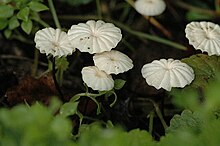Marasmiaceae
| Marasmiaceae | |
|---|---|

| |
| Marasmius rotula | |
| Scientific classification | |
| Domain: | Eukaryota |
| Kingdom: | Fungi |
| Division: | Basidiomycota |
| Class: | Agaricomycetes |
| Order: | Agaricales |
| Family: | Marasmiaceae Roze ex Kühner (1980) |
| Type genus | |
| Marasmius Fr. (1835)
| |
| Diversity | |
| Over 50 genera, 1500+ species. | |
| Synonyms[1] | |
|
Omphalotaceae Bresinsky 1985 | |
The Marasmiaceae are a family of basidiomycete fungi which have white spores. They mostly have tough stems and the capability of shrivelling up during a dry period and later recovering. The widely consumed edible fungus Lentinula edodes, the shiitake mushroom, is a member of this family. According to a 2008 estimate, the family contains 54 genera and 1590 species.[2]
The family Omphalotaceae, described by A. Bresinsky in 1985[3] as a segregate from the Tricholomataceae, has been considered synonymous with Marasmiaceae.[1] However DNA analysis by Moncalvo et al. in 2002 and Matheny et al. in 2006 have now led to that family being accepted by Species Fungorum and most recent references. The following genera are included in that family : Anthracophyllum, Gymnopus, Lentinula, Marasmiellus, Mycetinis, Rhodocollybia, Omphalotus.[4][5][6][7]
Genera
See also
References
- ^ a b Kirk et al. 2008, p. 481
- ^ Kirk et al. 2008, p. 401
- ^ Kämmerer, A.; Besl, H.; Bresinsky, A. (1985). "Omphalotaceae fam. nov. und Paxillaceae, ein chemotaxonomischer Vergleich zwier Pilzfamilien der Boletales". Pl. Syst. Evol. 150 (1–2): 101–117. doi:10.1007/BF00985571.
- ^ "One hundred and seventeen clades of euagarics". Molecular Phylogenetics and Evolution. 23 (3): 357–400. 2002. Retrieved 2018-06-11.
{{cite journal}}: Unknown parameter|authors=ignored (help) - ^ "Major clades of Agaricales: a multilocus phylogenetic overview". Mycologia. 98 (6): 982–995. 2006. PMID 17486974.
{{cite journal}}: Unknown parameter|authors=ignored (help) - ^ Antonín, V.; Noordeloos, M. E. (2010). A monograph of marasmioid and collybioid fungi in Europe. Postfach 1119, 83471 Berchtesgaden, Germany: IHW Verlag. pp. 395–396. ISBN 978-3-930167-72-2.
{{cite book}}: CS1 maint: location (link) - ^ For example, see the Species Fungorum page for genus Mycetinis: "Mycetinis page". Species Fungorum. Royal Botanic Gardens Kew. Retrieved 2017-05-23.
- Kirk, P.M.; Cannon, P.F.; Minter, D.W,; Stalpers, J.A. (2008). Dictionary of the Fungi (10th ed.). Wallingford: CABI. ISBN 978-0-85199-826-8.
{{cite book}}: Invalid|ref=harv(help)CS1 maint: extra punctuation (link) CS1 maint: multiple names: authors list (link)  Media related to Marasmiaceae at Wikimedia Commons
Media related to Marasmiaceae at Wikimedia Commons
